 Tourist Destinations City of Buenos Aires (In Spanish)
Tourist Destinations City of Buenos Aires (In Spanish) By Regions
By RegionsCity of Buenos Aires, Hotels and Tours
Buenos Aires City, Hotels and Tours, Argentina
As a neighborhood located in the Historical Area of City of Buenos Aires, Montserrat stands as a tourist attraction for its ability to drive towards the local and national past knowledge through old buildings and other spaces and significant elements. Montserrat is crossed by Avenida de Mayo, and in that way gets a perfect mix between the first suburb and the lights of progress.
As the first neighborhood of the city, Montserrat was the seat of the most traditional families, as well as of temples and institutions established in the foundation and Colonial stage. However, the yellow fever epidemic of 1871 caused its population mass exodus, receiving waves of immigrants, and mutation of the houses in tenements.

Among the unmissable attractions are the Casa Rosada and Cabildo, the popular Plaza de Mayo, the beautiful Manzana de las Luces and the impressive Catedral Metropolitana and the Basílica Nuestra Señora del Rosario/ Convento Santo Domingo where Manual Belgrano rests.
Monserrat counts with three major museums: Museo de la Ciudad, where old Buenos Aires everyday objects can be observed; Museo Etnográfico Juan B. Ambrosetti, which exhibits the largest collection of the Condorhuasi, Ona, Tehuelche, Guarani and Toba cultures’ elements; and Museo Nacional del Grabado, with current and old elements.
Café La Puerto Rico inaugurated in 1887 and still open to the public; and Librería de Ávila, with experience in the business since 1785, complete the tourist proposal of Montserrat, among multiple buildings that belong to representative characters of Argentina's history, religious monuments and shelters related.

As the first neighborhood of the city, Montserrat was the seat of the most traditional families, as well as of temples and institutions established in the foundation and Colonial stage. However, the yellow fever epidemic of 1871 caused its population mass exodus, receiving waves of immigrants, and mutation of the houses in tenements.

Picture - Argentinaturismo.com.ar
Among the unmissable attractions are the Casa Rosada and Cabildo, the popular Plaza de Mayo, the beautiful Manzana de las Luces and the impressive Catedral Metropolitana and the Basílica Nuestra Señora del Rosario/ Convento Santo Domingo where Manual Belgrano rests.
Monserrat counts with three major museums: Museo de la Ciudad, where old Buenos Aires everyday objects can be observed; Museo Etnográfico Juan B. Ambrosetti, which exhibits the largest collection of the Condorhuasi, Ona, Tehuelche, Guarani and Toba cultures’ elements; and Museo Nacional del Grabado, with current and old elements.
Café La Puerto Rico inaugurated in 1887 and still open to the public; and Librería de Ávila, with experience in the business since 1785, complete the tourist proposal of Montserrat, among multiple buildings that belong to representative characters of Argentina's history, religious monuments and shelters related.

Picture - Argentinaturismo.com.ar




 La Boca
La Boca
